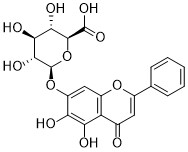
Baicalin | 21967-41-9
$20.00 - $68.00
All products have special prices for bulk purchase, please contact for more details if required.
Cat. No.: BCLN-0.2 (for 10mM×0.2ml)
Cat. No.: BCLN-25 (for 25mg)
Cat. No.: BCLN-100 (for 100mg)

Description
Baicalin, a flavonoid glycoside extracted from Scutellaria baicalensis, demonstrates a reduction in NF-κB expression.
Basic Information
- Aliases: Baicalein 7-beta-D-glucuronide; Baicaloside; Baicalein 7-O-β-D-glucuronide
- Source: Scutellaria baicalensis Georgi
- Compound type: Flavonoids > Flavones
- Chemical Formula: C21H18O11
- Molecular Weight: 446.36
- CAS Number: 21967-41-9
- Purity: 98%, HPLC
- Solvent/Solubility: DMSO: ≥ 100 mg/ml (393.33 mM)
- Solution Preparation: 5mg added to 1.12ml DMSO, or 4.46mg added to 1ml DMSO, to prepare a 10mM solution.
Signaling Pathway
Autophagy
In Vitro Study
Baicalin shields against ischemia-reperfusion injury (IRI) by modulating the production of various mediators, including reactive oxygen species (ROS), Toll-like receptor (TLR)2 and TLR4, NF-κB, Bax, and Bcl-2. Baicalin treatment curbs the heightened expression of proinflammatory cytokines TLR2/4, MyD88, p-NF-κB, and p-IκB, while augmenting the expression of IκB protein, an NF-κB inhibitor, with the extent of inhibition positively correlating to the dosage of Baicalin. Cell viability is gauged using MTT assay. In comparison to control cells, SH-SY5Y cells treated with thrombin exhibit significantly reduced cell viability. Pre-treatment with Baicalin (5, 10, 20 μM) escalates cell viability in a dose-dependent manner compared to cells treated with thrombin alone.
In Vivo Study
Baicalin pretreatment exhibits a dose-dependent protective effect against renal function loss, notably observed with the two higher doses (10 and 100 mg/kg), which significantly reduce serum creatinine (Scr) and blood urea nitrogen (BUN) concentrations. Tissue injury, evaluated using a 0-3 point scoring system, is lower in the Baicalin-treated groups compared to the ischemia-reperfusion (IR) + saline group. Furthermore, in rats treated with 10 and 100 mg/kg Baicalin, malondialdehyde (MDA) content is only marginally increased, and superoxide dismutase (SOD) activity is only slightly decreased compared to the sham group, indicating Baicalin's ability to mitigate the rise in oxidative stress post-reperfusion.
Clinical Trial
N/A
Storage
Store at -20°C for at least one year. The solid powder is stable at 4°C for at least one month. If dissolved in a non-DMSO solvent, it is recommended to aliquot and store at -80°C for up to six months.
Precautions
- This product may have a certain degree of toxicity to the human body. Please take appropriate precautions to avoid direct contact with the body or inhalation.
- This product is for scientific research use only by professionals and is not intended for clinical diagnosis or treatment, food, or pharmaceutical purposes. It should not be stored in ordinary residential areas.
- For your safety and health, please wear laboratory attire and disposable gloves while handling.
Only for research and not intended for treatment of humans or animals

Journals Using SBS Genetech Products Universities Using SBS Genetech Products

SBS Genetech is a long-term sponsor of Cold Spring Harbor Laboratory









